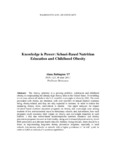| dc.rights.license | In Copyright | en_US |
| dc.creator | Babington, Alana Ellis | |
| dc.date.accessioned | 2017-05-19T13:14:31Z | |
| dc.date.available | 2017-05-19T13:14:31Z | |
| dc.date.created | 2017 | |
| dc.identifier | WLURG38_Babington_POV_2017_A | |
| dc.identifier.uri | http://hdl.handle.net/11021/33850 | |
| dc.description | Alana Ellis Babington is a member of the Class of 2017 of Washington and Lee University. | en_US |
| dc.description | Capstone; [FULL-TEXT FREELY AVAILABLE ONLINE] | en_US |
| dc.description.abstract | The obesity epidemic is a growing problem. Adolescent and childhood obesity is compounding the already high obesity rates in the United States. If something is not done, almost all adults in the U.S. could be overweight or obese by 2048. The costs associated with obesity are immense, with over one-fifth of annual medical expenses being obesity-related, and they are only expected to increase. In order to reduce the escalating obesity crisis, intervention is needed. This paper analyzes the impact of school-based nutrition education programs on obesity and overweight rates among students of low socioeconomic status in elementary schools, and, furthermore, how such programs could maximize their impact on obesity and overweight reduction in such schools. I find that school-based multicomponent nutrition education and obesity prevention programs focused on both healthy eating and increased physical activity lower BMI percentiles and alleviate health risks for children. Going forward, there should be a focus on implementing long-term obesity prevention programs, especially in rural schools, low-income schools, or schools with a higher prevalence of ‘at risk' youth in order to fulfill an individual's nutrition capabilities. | en_US |
| dc.description.statementofresponsibility | Alana Babington | |
| dc.format.extent | 32 pages | en_US |
| dc.language.iso | en_US | en_US |
| dc.rights | This material is made available for use in research, teaching, and private study, pursuant to U.S. Copyright law. The user assumes full responsibility for any use of the materials, including but not limited to, infringement of copyright and publication rights of reproduced materials. Any materials used should be fully credited with the source. | en_US |
| dc.rights.uri | http://rightsstatements.org/vocab/InC/1.0/ | en_US |
| dc.subject.other | Washington and Lee University, Shepherd Poverty Program | en_US |
| dc.title | Knowledge is Power: School-Based Nutrition Education and Childhood Obesity | en_US |
| dc.type | Text | en_US |
| dcterms.isPartOf | RG38 - Student Papers | |
| dc.rights.holder | Babington, Alana Ellis | |
| dc.subject.fast | Obesity in children -- Prevention | en_US |
| dc.subject.fast | Nutrition | en_US |
| dc.subject.fast | Diet | en_US |
| local.department | Shepherd Poverty Program | en_US |
| local.scholarshiptype | Capstone | en_US |
